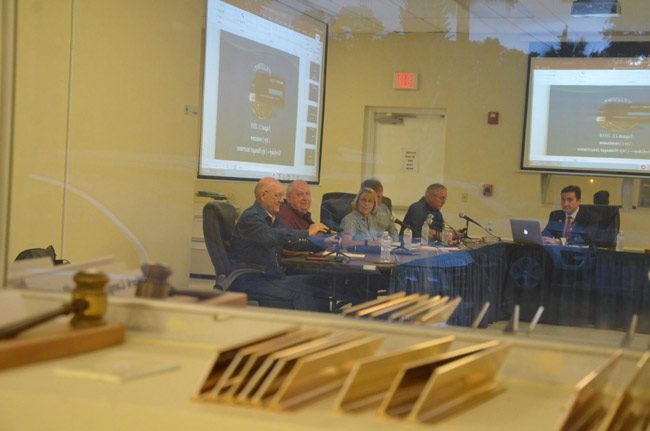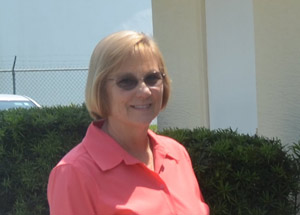
The Bunnell Charter Review Committee submitted seven proposed amendments to the city charter this week.
The seven-member committee was appointed by the commission as required by its charter, which calls for such a review at least every five years. The committee met five times in open sessions in August and September, reviewing the whole charter and drafting the seven proposed amendments with the help of City Attorney Wade Vose and City Clerk Kristen Bates.
The proposed amendments address matters relating to commissioners facing criminal charges, commissioners’ pay, commissioners’ interaction with city staff, the vice-mayor’s selection, the city manager’s geographical residential requirement, who may serve on the charter committee, and the commission’s contractual powers. The charter is like the city’s constitution–a set of broad-brush principles and rules distinct from the city’s code of ordinances. Ordinances may be changed by the commission at any time, with two public hearings. The charter may be amended only with voters’ approval.
It’s now up to the commission to decide which of the proposals to place before voters on the city’s March 5 election and in what form.
“The ultimate discretion authority to place charter amendments on the ballot lies with you all,” Vose told commissioners. “You all could choose to place all of these on the ballot, place some of these on the ballot, make changes to some or all of these, or introduce an entirely new subject that the Charter Review Committee either addressed and didn’t want to bring to you or that you all think of yourselves.”
Before any proposals make it to the ballot, the commission must draft an ordinance and hold two public hearings, two weeks apart, and approve conveying the proposals to the ballot by majority vote.
On Monday, commissioners appeared to agreed to place at least five of the proposals on the ballot, with further discussion ahead on the remaining two: commissioners’ pay, and the commission’s required quorum when the fate of the city manager is in play.
The first question, on when and how to award commissioners raises, drew a spirited discussion and was left unsettled. The proposal would limit any raises for commissioners to no more than the average raise awarded city employees that year. If commissioners seek more, they have to ask voters through a referendum. “There isn’t any danger of us jacking up our salaries,” Commissioner John Sowell said.
“As I recall we took a 10 percent cut five years ago,” Mayor Catherine Robinson said.
But Commissioner Elbert Tucker was not thrilled by the proposal. “In the future you’re going to have trouble getting people to run por this amount of money,” he said, referring to commissioners’ salaries of $9,600 a year. Tucker himself is not running again, he said–to his colleagues’ dismay–so he wasn’t speaking out of self-interest. “But in my opinion this is going to hurt you in the future.” Tucker said the salary needs to be addressed before the next election to get candidates interested in taking time away from their job.
“I would support a substantial increase if Mr. Tucker would agree to run again,” Sowell said.
“As I recall Mr. Tucker and I have voted against pay raises in the past,” the mayor said.
Seven largely uncontroversial amendments following a committee’s quinquennial exercise.
“I know better now,” Tucker said.
“He knows better now, as he’s going out the door on his white horse, sailing in the sunset, he knows better now,” the mayor said.
Commissioners agreed to discuss the matter further on Oct. 22.
The next three proposals drew quick approval, including a proposal that would result in a commissioner or the mayor forfeiting office if convicted of a felony or a first-degree misdemeanor that has direct bearing on the job as an elected official. Forfeiture would also apply with regards to certain ethics violations, if the violation leads to a suspension by the governor. The proposal on crimes is becoming a standard part of more recently-drafted charters, Vose said, as it pre-empts commissioners improvising reactions when one of their own faces criminal charges. Commissioners approved without much discussion.
The third question clarifies that when commissioners ask questions of city staffers, it’s not confused with giving orders to staffers, which would be prohibited. “It is not considered giving orders simply to ask a question,” Vose said.
“We operate that way now,” Robinson said.
The fourth question seeks to clarify the selection of the vice-mayor, to make clear that the commission chooses a vice mayor every year.
The fifth question addresses two issues relating to the city manager: it would require the “entire” five-member commission to be present when the city manager’s appointment, firing or compensation is up for a vote. But the word “entire” was not defined. It also expands the radius of the manager’s permissible residency, from 40 miles around Bunnell to the entirety of Flagler County. The latter part was not questioned much. But the quorum issue was.
Sowell was concerned about the requirement that the full commission be present for such votes, saying how some elected officials can play games, purposefully missing meetings to prevent a key vote. “Three is three,” Sowell said, “and if one person chooses not to be there because they want to protect somebody or play those games, this, the way it’s written, is going to allow them to do that.”
“Everybody on the commission needs to have a voice in that action,” Robinson said.

That very evening a commission workshop was cancelled because Vice Mayor John Rogers was absent (he just got married). If meetings can be cancelled for that reason, important decisions such as the city manager’s fate should be similarly treated, the mayor said.
Commissioner Bill Baxley seconded her. “This year, when I was on vacation and I was legally excused, I got word from FlaglerLive, me reading FlaglerLive on my vacation that Dan Davis was fired. I had no input, no say-so, nothing,” Baxley said. “If it hadn’t been for me looking on FlaglerLive, I would not have even known about it.”
“Thank goodness for FlaglerLive,” Commissioner Tucker said.
The issue was left unsettled.
The next two questions were relatively uncontroversial: one question would “clarify that the membership of the Charter Review Committee may include nonresident owners of businesses within the City.” The current wording allows for just such representation: Mark Langello, one of the members of the charter committee, lives on the barrier island but owns the Atlantis commercial strip in Bunnell. The proposal had his imprint. Robinson was concerned only to the extent that it would allow for the entire membership of the charter review committee to be made up of non-resident businesses.
The final proposal strengthens the commission’s contractual powers when the city hires planning and other professional services.
The committee was made up of Langello (business owner), Scott Sowers (Bunnell elector), Tanya Gordon (Bunnell elector), Michelle Woodin (Bunnell elector), Bonita Robinson (Bunnell elector), Deen Wall (Flagler County registered voter living in Bunnell), and David Williams (Bunnell elector).
The full proposals as currently drafted are below.
![]()
Bunnell’s Charter Review Proposals (2018):
Click to access bunnell-charter-proposals.pdf





























Leave a Reply